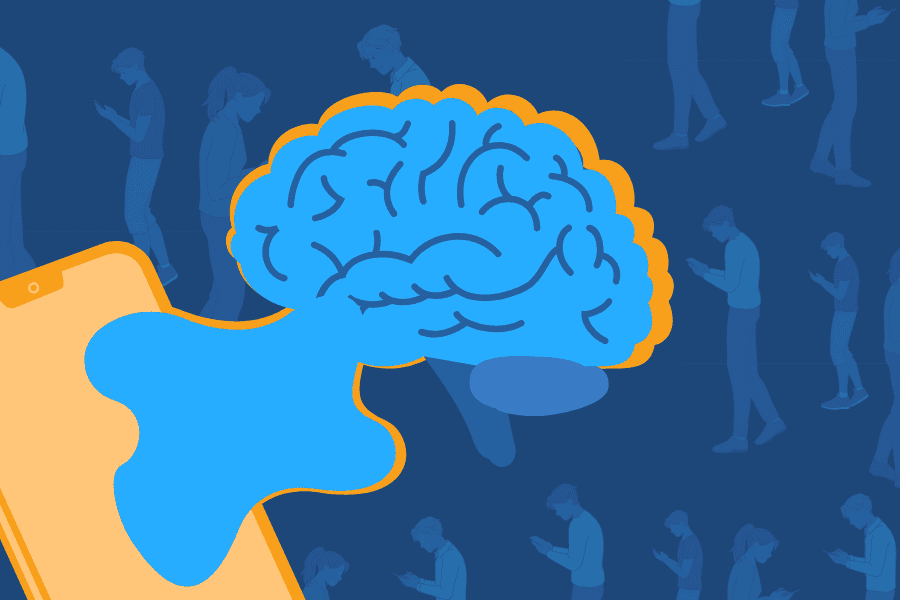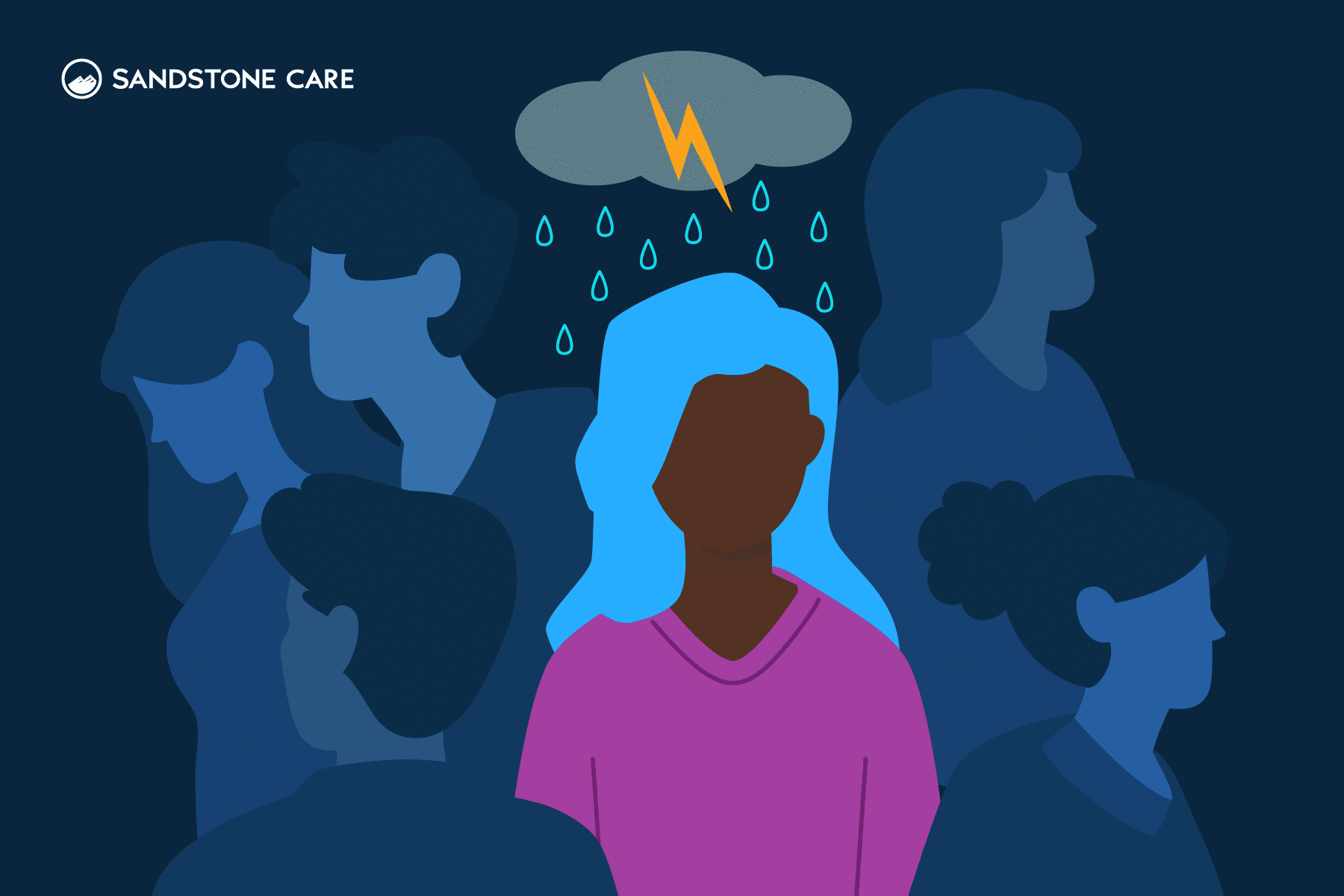Brain Rot Meaning
What Is Brain Rot?
Brain rot is a popular and relatively new word often used in internet culture that can refer to spending an excessive amount of time scrolling through social media or absorbing low-quality online content.
This term is most often used among young people in a humorous or lighthearted way.
There’s nothing wrong with spending some of your free time on apps like TikTok or other online media sites. It can be a way to relax and decompress. It can also be a way to connect with others.
However, if you’re spending too much time online aimlessly scrolling, this can become a problem. Some people may do this as a way to escape real-world problems or to try to cope with mental health problems they may be dealing with. In reality, though, this can make mental health problems worse.
You may be surprised to find out that a recent survey discovered that the average amount of time that U.S. teenagers spend on social media is approximately 3.5 hours a day. If you calculate how much that adds up to in a full week, you will find that it comes out to 24.5 hours. That’s just over one full day!
Some young people also struggle with addictions to social media or the internet as a whole, making it difficult for them to cut back on the time they spend online. The good news is that through professional assistance, you can develop a healthier relationship with the internet. Our team at Sandstone Care can help.
Is Brain Rot a Real Thing?
The way that brain rot is used in the online world is not meant to refer to the brain actually rotting.
In addition, it is important to note that overconsumption of the internet does not cause brain rotting. However, brain rot, when used as a slang term, does refer to an actual phenomenon.
When people talk about brain rotting as a non-medical condition, they’re usually talking about spending an excessive amount of time scrolling online, playing video games, or watching television.
In many cases, content that is described as “brain rot” is low-quality. For example, it might not present any real helpful or educational benefit. It might not even provide much mental stimulation, but it is the type of content someone consumes almost mindlessly.
The mental consequences that brain rot can lead to can be very real. They may include mental burnout or sluggishness.
In some cases, it can even lead to feelings of guilt or shame. This is because you might feel bad about spending so much time scrolling rather than doing something productive. It can also lead to trouble falling asleep and overall poor sleep quality.
What Causes Brain Rot?
Brain rot is most often caused by too much screen time, whether it involves social media, video games, or television.
In most cases, the type of content that is being consumed is low-quality and not mentally stimulating. It could be TikTok videos, Instagram reels, memes, or other similar content. In many cases, someone taking part in brain rot content will absorb a large amount of this kind of content without taking any breaks to do something more stimulating.
Why Is Brain Rot The Word of the Year 2024?
Oxford University Press chose “brain rot” as the 2024 word of the year due to how heavily it was used on social media.
It is meant to refer to the supposed deterioration of a person, particularly from a mental standpoint, due to overconsumption of online material.
Other notable words became popular in media use in 2024 that didn’t quite make the cut for Oxford Word of the Year. Some examples include slop, demure, rizz, and skibidi toilet. These words were particularly among the group of young people known as Gen Alpha.
What many people might not realize is that while it just became popular last year, the word brain rot was first used many years ago. Its first recorded use was by American writer Henry David Thoreau in 1854 in his book Walden. Thoreau used it as a way to refer to the way that many people prefer simplicity over deeper ways of thinking.
Examples of Brain Rot
What Are Some Brain Rot Examples?
Some common popular brain rot examples include endless TikTok or Instagram reels scrolling, memes, and fan edits.
Some people may also refer to AI-generated content as brain rot or anything that would be considered low-quality or not mentally stimulating.
Do Video Games Rot Your Brain?
Video games do not physically rot your brain, and in some cases, may even be associated with some benefits.
For example, video games have been said to improve coordination, critical thinking, and problem-solving skills. They can also help relieve stress and encourage social interaction. This can be especially beneficial for teens and young people.
However, if you spend an excessive amount of time playing video games, it can lead to some serious problems. Some people may spend hours on end playing video games without taking time for meals, exercise, or doing something productive. This can lead to addictive behaviors, sleep issues, and mental health problems.
Other signs that your video game habits could be becoming unhealthy include:
- Problems with relationships as a result of video games
- Trouble keeping up with personal or professional obligations
- Decreased performance at work or school
- Wanting to cut back on video games but struggling to do so
- Staying up all night or rarely sleeping due to playing video games
If you’ve wanted to cut back or quit playing video games but struggled to do so, turning to a mental health professional could be a helpful step.
Is Doom Scrolling an Example of Brain Rot?
Yes, doom scrolling is a common example of brain rot.
Doomscrolling refers to scrolling through negative or distressing news for a long time. Many people have trouble trying to stop doomscrolling, even though they recognize that it is detrimentally affecting their mental health.
This term became particularly common during the COVID-19 pandemic. Many people wanted updates about what was going on, even though constantly checking for updates made them more stressed out. Doomscrolling can also lead to anxiety, depression, and hopelessness.
What Is Brain Rot Phone Usage?
Brain rot phone usage can refer to unhealthy habits regarding your cell phone use, particularly when it comes to excessive screen time or mindless scrolling.
Brain Rot and Your Emotional and Mental Health
What Does Brain Rot Feel Like?
Brain rot can make you feel mentally sluggish, foggy, or distracted.
You may also have trouble focusing and may notice that you have a decreased attention span.
What Are the Side Effects of Brain Rot on Emotional Health?
Brain rot can cause you to experience problems with your emotional health by causing you to feel desensitized or as things don’t bring you excitement or joy in the way they once did.
Brain rot can also lead to anxiety, depression, burnout, low motivation, and even low self-esteem.
How Does Brain Rot Affect Mental Health?
Brain rot can affect mental health by causing increased stress, depression, and anxiety.
What are Examples of How Brain Rot Is Affecting Gen Z?
Brain rot is affecting Gen Z by causing some people to experience greater mental health concerns.
These concerns particularly involve anxiety, depression, and self-esteem issues.
Brain Rot and the Developing Brain
How Does Brain Rot Affect Children?
Brain rot can be particularly detrimental for children because their brains are still developing.
When children consume low-quality, short-form content, they may experience bursts of dopamine, which is a feel-good hormone inside the brain. However, once they get used to this, they may find enjoyment from other forms of content more difficult. Learning can become challenging for them.
In other words, they can become used to needing to be constantly entertained. If they don’t have the type of entertainment they’re used to, they can become bored and have trouble focusing. This can lead to problems paying attention and poor performance at school.
Does Too Much Screen Time Affect Brain Development?
Yes, too much screen time can negatively affect brain development, especially for children.
It can lead to attention and focusing problems, sleep issues, mood swings, and even communication delays.
What are the Cognitive Effects of Too Much Screen Time?
Too much screen time can lead to cognitive effects such as a lower attention span, lack of impulse control, trouble learning, and mental fog.
Brain Rot and School Performance
How Does Brain Rot Affect Attention Span?
Yes, brain rot can shorten your attention span and make focusing more difficult.
How Does Brain Rot Affect School Performance?
Yes, brain rot can negatively affect school performance by making it more difficult for people to pay attention in class or focus on one task at a time.
They may also become less motivated and find less enjoyment in learning new things.
How Does Brain Rot Affect Critical Thinking?
Brain rot can make critical thinking more difficult because it is often associated with a more simplified way of thinking and a poor attention span.
Brain Rot and Relationships
Can Brain Rot Affect Familial Relationships?
Yes, brain rot can affect familial relationships, and it can be in a very negative way.
Consider a young person who spends the majority of their free time in their room scrolling aimlessly through social media or constantly playing video games. Maybe they’re still caught looking at their phone during family dinners or other times when they are supposed to be present in the moment. This is going to impact their ability to connect with family members in an emotional or meaningful way.
As a result, this can lead to tension among family members and strained relationships.
Can Brain Rot Affect Professional Relationships?
Yes, brain rot can affect professional relationships because it can make it seem as if someone cares more about scrolling through their phone than they do about focusing on their job.
This can make them seem unprofessional. It can also lead to poor communication and even decreased performance at work.
How Does Brain Rot Affect Romantic Relationships?
Brain rot can lead to emotional distance within romantic relationships.
This is because the individual may seem more interested in staring at their phone than having a meaningful conversation with their significant other. This can also lead to communication issues and resentment.
Identifying If You Are Experiencing Brain Rot
Do I have Brain Rot?
You may have brain rot if you spend an excessive amount of time on your phone, have trouble with mindless scrolling, or have other unhealthy online habits.
Are There Signs of Brain Rot?
Yes, some signs of brain rot may include mental sluggishness, trouble focusing, sleep issues, and brain fog.
Are There Brain Rot Symptoms?
Yes, you may experience mental burnout, increased anxiety or depression, trouble focusing, or mental fogginess.
How Can I Tell If I Have Brain Rot From Too Much Screen Time?
Consider how you feel after spending an excessive amount of screen time.
Do you feel stressed, lethargic, anxious, or burned out? If so, you might have brain rot.
Brain Rot Treatment
How to Get Rid of Brain Rot?
You can get rid of brain rot by being more conscious of what type of media you are consuming and working to develop healthier online habits.
For example, consider limiting the time you spend on your phone or other screens throughout the day. You can set a timer on your phone to remind you when it is time to set your devices aside and do something healthy or productive. There are even apps that you can download to your phone to help monitor how much time you’re spending online.
What Is the Best Treatment for Brain Rot?
The best treatment for brain rot is decreasing your screen time and working to develop healthier online habits.
If you find yourself struggling to set these boundaries, you might consider working with a mental health professional. They can help you identify specific unhealthy habits that you may be taking part in. They can then help you positively address these habits.
How Many Hours of Screen Time Is Healthy?
This can vary depending on lots of factors, like your age, lifestyle, and the specific purpose your screen time serves.
Some people may have to use screens for work or school purposes and might not be able to cut back as much as they may like to. However, they can still develop healthy habits like taking breaks and going for walks to break up the time they spend online.
For most adults, it is considered beneficial to try to keep screen time under 2 hours a day. However, the most important thing is to remember to take breaks, avoid screens before bed, and make sure you’re taking good care of your mental and physical health.
Is Brain Rot Reversible?
Yes, brain rot can be reversible if you’re willing to be more conscious of the time you spend online and develop healthier habits when it comes to screentime.










